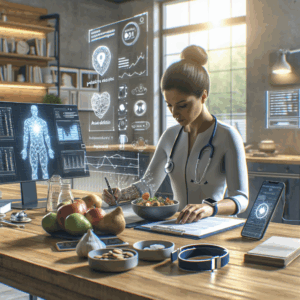
AI, with its impressive array of tools, has the potential to revolutionize dietetics, offering bespoke solutions that ease the strain on dietitians and enhance their performance significantly. Predictive analytics, meal planning automation, personalized dietary recommendations, wearable integration, and real-time health data analysis are just a few transformative AI applications, combining to build a more efficient dietetics landscape.
Predictive analytics, for instance, leapfrogs traditional methods of diet planning by leveraging individual health data to forecast health impacts of different dietary habits, enabling a more proactive and effective approach towards dietary planning. The popular AI platform, Nutrino, combines AI with expansive food databases and individual biometrics to generate precise nutrition recommendations, showcasing the potential of such integration.
In terms of data tracking, AI makes strides by incorporating wearable technology to gather real-time data. Dietitians equipped with this data can track their clients’ calorific intake, level of physical activity, sleep patterns, and even hydration levels, enabling personalized and timely advice while reducing their workload.
While these technological advancements offer exciting prospects, they also present new ethical considerations. Firstly, the integration of AI should not compromise the personal connection between a dietitian and their client. A human touch is key, ensuring the empathetic understanding and emotional support that AI can’t replicate. Second, with the ever-increasing prominence of AI and data rely on data privacy and confidentiality, it’s an utmost necessity to protect clients’ sensitive health data.
Despite these challenges, the integration of AI technology seeks to strengthen rather than replace the role of registered dietitians. AI is a tool, a cordial ally, facilitating their role in cultivating healthier lifestyles. Applications like DayTwo offer glimpses into the future, pairing dietitians with AI algorithms to offer personalized nutrition advice based on microbial genome mappings.
Looking ahead, dietitians have the opportunity to reach more people, more effectively than ever before. The integration of AI offers a future where dietitians, free from tedious tasks, can focus on relationship-building and personalized care. This synergy provides a dynamic vision of how technology and human touch can harmoniously operate, increasing the scale of positive health outcomes.
In sum, we’re on the cusp of witnessing an extraordinary revolution in nutritional care. By incorporating artificial intelligence, the role of registered dietiticians will not only become more efficient but also extend their reach — a prospect that can significantly transform global health outcomes. The future decidedly looks well-nourished!
Leave a Reply